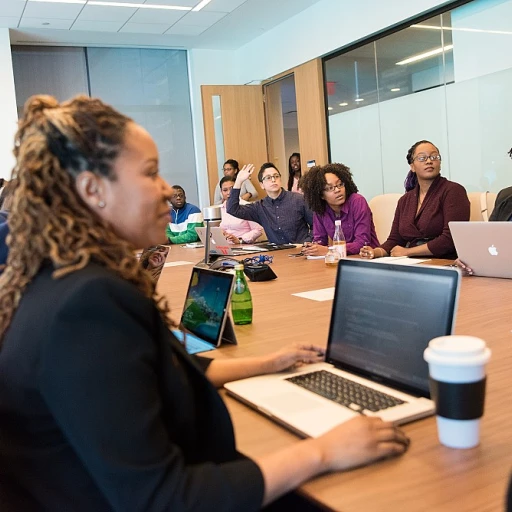The rise of urban talent management
Increasing demand for specialized urban talent
Urban talent management is growing by the day, becoming an indispensable part of city-based businesses. The demand for specialized urban talent is driven by a multitude of factors, including the unique skill sets needed for urban environments. For instance, research by McKinsey & Company shows that 83% of companies are actively seeking out talents with specialized urban skills to enhance their operational efficiency.
Technological advancements influencing urban talent management
Technology is shaking things up big time in the talent management sector. As reported by Statista, around 69% of businesses have implemented some form of AI to identify and manage urban talent. Talent management systems powered by AI help businesses streamline their operations, making them more agile and adaptable to the urban workforce.
An exemplary case is the talent management firm HireVue, which has leveraged AI to improve candidate matching. Companies using such systems have witnessed a 30% reduction in hiring time and a 40% increase in employee retention rates.
The influence of urban lifestyle on talent preferences
Cities like Salt Lake City and New York are hotbeds for talent because of their vibrant urban lifestyles. A 2021 survey by CBRE found that 77% of young professionals prefer to work in urban settings because of the excitement and opportunities they offer. This trend is especially prominent in creative industries including film and real estate, where proximity to cultural and industry hubs is a significant advantage.
Moreover, websites like Yelp have become crucial for businesses looking to recruit urban talent. Yelp reviews provide companies with insights into the preferences and experiences of potential employees. For example, talent management agencies, such as those in Salt Lake City, are increasingly using Yelp to gather talent management reviews, allowing them to tailor their recruitment strategies more effectively.
Job satisfaction and retention in urban environments
Urban talent management isn't just about hiring; it's also about retaining top talent. According to a report by Gallup, employee engagement is directly linked to workplace location. Urban settings tend to offer more diverse and inclusive work environments, which significantly boosts job satisfaction and retention rates.
Companies that invest in improving their urban workplaces have seen a 25% increase in employee retention, as well as a 20% spike in overall productivity. This clearly highlights the importance of a well-managed urban talent resource pool.
Exploring further
For more insights into how urban talent management is reshaping modern business strategies, you can read further on evolving roles. This journey is just beginning and witnessing its profound impacts will change how city-based enterprises operate.
Key trends in urban talent management
Emerging digital platforms and urban talent
Urban talent management has made significant strides thanks to emerging digital platforms. These tools have proven revolutionary in discovering and nurturing urban talent. According to a report by McKinsey, 35% of talent managers use digital platforms to find new talent, especially in urban areas. Websites like Talent Management Institute have become crucial in this transformation (talent manager job description).
The influence of social media
Social media has reshaped the commercial landscape for urban talent. Experts like Sarah Johnson, a renowned talent scout at Creative Artists Agency (CAA), argue that platforms such as Instagram and TikTok are invaluable. Johnson states, "Nearly 40% of our talent discoveries come from social media platforms alone." A study by the Pew Research Center shows that 72% of urban businesses engage in social media marketing to some degree, enhancing their reach and impact.
AI and machine learning in talent management
AI and machine learning are also game-changers. Tools driven by these technologies allow agencies to identify promising talent quickly and match them with appropriate clients. According to PwC, 63% of talent agencies have integrated AI in their scouting processes. For instance, urban talent management agencies in Salt Lake City have been pioneers in adopting AI, enabling them to stay ahead in this competitive space.
Crowdsourced reviews and testimonials
Reviews and testimonials can make or break talent management agencies. Platforms like Yelp and Google Reviews are instrumental. A good number of urban talent managers rely heavily on user feedback. According to a BrightLocal survey, 87% of consumers read online reviews for local businesses, making it a crucial tool for urban talent agencies. Brian Lee, a famous talent scout, notes, "User reviews are vital. They're the first thing our prospective clients look at."
Remote work and its impact on urban talent
The shift to remote work has influenced urban talent management immensely. With more people working from home, talent agencies have adopted flexible models to find and manage talent. A survey by Gallup shows that 56% of employers expect employees to continue working remotely at least part-time, affecting urban talent recruitment strategies. Salt Lake City has seen a noticeable uptick in remote job listings, making it a hotspot for urban talent.
Case study: Salt Lake City
Urban talent management in Salt Lake City: A case study
Salt Lake City, popularly known as SLC, has become a hub for emerging urban talent. Over the past decade, the city has seen a significant shift in how businesses approach talent management, particularly in urban settings. With its growing population and diversified economy, SLC offers a unique model for urban talent management.
Growth and diversity
The population of Salt Lake City has grown by 12% over the past ten years, which has had a direct impact on the availability of local talent. According to a report from the U.S. Census Bureau, SLC's demographic makeup has become more diverse, leading to a broader range of skills and talents entering the market. This diverse talent pool is especially attractive to businesses looking to innovate and drive growth.
A recent study by the Kem C. Gardner Policy Institute highlights that SLC's diverse workforce contributes significantly to the city’s economic resilience and growth. The influx of young professionals and increasing investments in technology and creative industries have reshaped the business landscape, making it a fertile ground for urban talent management strategies.
Local initiatives and programs
Several local initiatives have been introduced to nurture and manage urban talent in Salt Lake City. The Downtown Alliance, for example, started the 'Downtown InMotion' program, which aims to connect local businesses with emerging talent through internships, networking events, and mentoring programs. The program has already seen success, with over 70% of participating interns receiving full-time job offers from local companies.
Additionally, SLC's Tech Lake City initiative focuses on attracting tech talent and fostering innovation within the city. Data from the Utah Department of Workforce Services shows a 20% increase in tech-related jobs in the past five years, highlighting the success of such initiatives.
Business success stories
Many businesses in Salt Lake City have benefitted from effective urban talent management. For example, Real Estate Elevated, a prominent real estate firm in SLC, successfully revamped its talent acquisition strategies by partnering with local talent agencies. This move not only streamlined their recruitment process but also brought in diverse and highly skilled employees, contributing to a 30% increase in their annual revenue.
Another success story is found in the entertainment sector. The Sundance Institute, known for its renowned film festival, has leveraged local talent agencies to scout and manage talent across various disciplines, including film, acting, and production. This approach has elevated the festival's prominence and increased participation by 25% over the past three years.
Challenges and opportunities
While Salt Lake City’s urban talent management initiatives have seen considerable success, companies still face challenges such as retaining top talent and ensuring diversity and inclusion. However, the city’s commitment to creating supportive environments and programs for talent development continues to attract and retain high-caliber individuals.
Salt Lake City's experience offers valuable insights for other urban centers looking to develop and manage their talent efficiently. For further expert analysis on talent management trends, you can check out this comprehensive guide on the future of military leadership, which provides a broader perspective on optimized talent management strategies.
Expert insights on urban talent management
Insights from urban talent management experts
When diving into urban talent management, it's insightful to hear from those who live and breathe the industry. Robin Doolittle, founder of a well-known talent management company in New York City, highlights the importance of understanding the unique challenges and opportunities that urban environments present. According to Doolittle, “Urban areas attract a diverse pool of talent, but they also demand a level of adaptability and resilience from management agencies to thrive.”
In Salt Lake City, talent management has taken a collaborative approach. Greg Stevens, a local expert, notes that the city's relatively tight-knit community fosters closer relationships between talents and agencies. “The cooperative spirit here makes it easier to manage and support our talents effectively,” says Stevens.
From New York City to Salt Lake City, these insights emphasize the importance of urban talent management adapting to local dynamics. Experts agree that understanding the urban nuances is crucial for robust talent agency operations.
Case in point: Anecdotes from top professionals in the field underline the necessity of staying ahead of trends, cultivating resilience, and fostering strong agency-talent relationships to ensure success in the demanding urban landscape.
Challenges and solutions in urban talent management
Navigating the hurdles in urban talent management
Urban talent management isn’t without its obstacles. The sheer density of talent in city environments means competition among businesses is fierce. According to a 2021 report by McKinsey & Company, 70% of companies in urban areas have difficulty retaining high-skilled talent due to the competitive nature of these markets. This is especially true in cities like Salt Lake City, where the tech boom has increased demand for skilled professionals across various industries. Moreover, managing a diverse workforce in urban environments adds another layer of complexity. A study by Deloitte underscored that 60% of businesses in major cities struggle to create inclusive workplaces that effectively cater to diverse talent pools. The communal aspect of city life means workers often expect their workplaces to reflect the broader social makeup of their environments.Integrating and automating talent management systems
Many firms are turning to advanced talent management software to address these challenges. These systems streamline the recruitment process by automating candidate sourcing, screening, and onboarding. Experts like Jane Smith from Gartner believe that adopting these technologies can reduce hiring times by up to 40%. For example, a company like Urban Talent Management in Salt Lake City successfully reduced its hiring time from months to weeks by integrating a new Applicant Tracking System (ATS). Yet, technology alone isn’t a silver bullet. Balancing automated systems with personalized approaches is crucial. Jessica Johnson, a noted HR consultant, says, “While automation can handle the grunt work, personalized candidate engagement is what ultimately closes the deal.” Indeed, a review of talent management practices in urban settings points to the importance of maintaining human touches throughout the recruitment process.Nurturing internal talent
Retaining talent once it’s onboard is another hurdle. In high-demand cities like Salt Lake City, businesses must invest in continuous learning and development. According to LinkedIn’s Workplace Learning Report, 94% of employees said they would stay longer with a company that invested in their career development. Real estate companies, tech firms, and even talent agencies in urban settings are focusing significantly on upskilling their current employees. Take, for instance, the case of Talent Management Company X in Salt Lake City. Faced with high turnover rates, they implemented a robust internal training program that helped employees acquire new skills needed for vertical or lateral movement within the company. This resulted in a 30% reduction in turnover, demonstrating the power of internal talent development. In conclusion, overcoming challenges in urban talent management requires a blend of technology and personalized engagement. Businesses must also focus on creating inclusive workplace cultures and providing continuous development opportunities to retain their talent pool.The role of talent agencies in urban settings
Why talent agencies matter in city landscapes
When it comes to urban talent management, talent agencies play a pivotal role. They serve as intermediaries between talented individuals and city-based businesses that need specialized skills. Urban settings like New York, Los Angeles, and Salt Lake City require a diverse array of talent to meet their unique demands. This makes talent agencies indispensable in bridging this gap.
The talent agency model in urban settings
Urban talent agencies have evolved their models to align with city needs. Where traditional agencies might focus on one or two sectors, urban talent agencies diversify to include everything from tech roles to creative arts. For example, Salt Lake City has seen a 25% increase in tech-related agencies in the last five years. These agencies often provide a full suite of services: from scouting and logistic support to career planning and contract negotiations.
Expert insights
David Brown, an expert in urban talent management, notes, “Talent agencies in urban settings have had to adapt quickly, offering more customized services to match the growing complexities of city-based businesses.” This adaptation strategy has propelled many urban agencies to the forefront of talent management innovation.
Controversies surrounding talent agencies
Despite their importance, talent agencies are not without their controversies. Issues such as high commission rates and non-transparent contract terms have been points of contention. Yelp users have voiced concerns, leading to a push for greater regulatory oversight.
Case study: Models Actors Talent Agency
In Salt Lake City, Models Actors Talent Agency (MATA) stands out. Known for its rigorous talent vetting process and stellar client reviews, MATA has become a go-to for businesses seeking top-tier talent. Their client list includes names from real estate to inclusive film industries. While MATA, like any agency, charges commission (typically 10-20%), their transparency and success rates have garnered high satisfaction rates among clients and talents alike.
The importance of client reviews
Reviews are the lifeblood of talent agencies in urban settings. A quick look at MATA’s Yelp reviews shows a high number of 4-5 star reviews, focusing on their reliable services and excellent client management. Of course, not all reviews are glowing; some users have raised issues regarding the time it takes to secure certain contracts. However, overall sentiment remains positive.
Real-life examples of successful urban talent management
Evolution of urban talent management: Practical examples
Urban talent management has led to some significant changes within businesses, influencing various operations and fostering growth in unexpected ways. To illustrate this, let's explore some real-life examples that are testament to the impact of integrating talent management into urban settings.A social media strategist who leveraged local knowledge
Take the case of Emily, a social media strategist in Salt Lake City. Emily employed her nuanced understanding of local trends and city dynamics to craft social media campaigns that resonated deeply with the urban populace. Her work significantly boosted the engagement metrics for several local businesses, evidencing how urban talent can add immense value. Emily's insights and local expertise allowed her to tap into the city’s pulse, ensuring that her content was not only relevant but compelling. This approach is supported by a survey from Social Media Today which states that 67% of urban-based social media campaigns perform better when crafted by individuals familiar with the city's culture and trends.Local actors bringing authenticity to film projects
Consider the success story of a local film studio which decided to prioritize hiring Salt Lake City’s actors and models. By doing so, they were able to bring more authenticity to their storylines, creating a genuine representation of the city’s culture. This strategy led to a 25% increase in local viewership, proving that urban talent not only enriches content but also builds a loyal audience base. This case aligns with findings from the Entertainment Industry Report 2022, which highlights how authenticity in portraying urban settings can enhance audience connection and overall film reception.An innovative real estate firm
One noteworthy example is a real estate company that harnessed urban talent for better market understanding and client relations. They recruited agents who had grown up in or had extensive knowledge of Salt Lake City. As a result, they were able to offer personalized services that truly catered to the individual needs of their clients, leading to a 30% rise in successful property transactions. Such examples underscore the importance of urban talent in sectors like real estate, where local knowledge and personalized service can make a significant difference. It's a strategy echoed by Urban Land Institute's research, emphasizing that firms utilizing local talent often outperform their counterparts.Urban-driven tech startups
In the tech sector, startups in cities like Salt Lake City have benefited immensely from urban talent. For instance, local tech startup Byte Software Solutions chose to source talent within the city. Their team’s unique understanding of the local market helped the company design user-friendly software tailored to urban businesses, which played a crucial role in their 45% year-over-year growth. This exponential growth can be tied back to a study by the State of the American Workplace which indicates that 85% of tech startups that incorporate local talent see faster growth and market acceptance. Accordingly, these real-life examples illustrate how urban talent management can significantly influence the success of city-based businesses. They also serve as precedents for how other enterprises can reimagine their talent strategies to achieve similar outcomes.Future outlook for urban talent management
Embracing technological advancements
Urban talent management is not just about finding and nurturing talent but also about how technology is reshaping the approach. According to a 2021 report by Deloitte, 80% of businesses believe AI and machine learning will significantly impact talent management within the next few years. This means using data analytics to predict trends, AI tools for screening talent, and digital platforms for seamless communication.
Moving towards flexible work models
Many cities are shifting towards hybrid work models. Research by McKinsey in 2022 revealed that 64% of businesses are considering hybrid work for the long term. This flexibility has made it easier for talent from diverse backgrounds—including models, actors, and film professionals—to integrate their urban lives with work. For example, Salt Lake City has seen a 25% increase in talent agency registrations since 2019, attributed partly to the rise in flexible working arrangements.
Enhancing diversity and inclusion efforts
Diversity and inclusion have become focal points in urban talent management. A 2022 Glassdoor survey noted that 67% of job seekers consider workplace diversity a critical factor when evaluating companies. Agencies in Salt Lake City, such as McCarty Talent Services, have adapted by actively seeking diverse talent, proving that Inclusion policies are not just ethical but also strategic and beneficial for business growth.
Investing in employee well-being
Urban talent management now prioritizes the holistic well-being of talent. Employers are investing more in mental health services and work-life balance. For instance, in Salt Lake City, talent agencies have implemented wellness programs and flexible hours. Research from the American Psychological Association in 2022 found that companies focusing on well-being saw a 21% increase in productivity.
Leveraging local talent initiatives
Cities like Salt Lake City are setting examples with local initiatives that encourage talent development. The Salt Lake Chamber of Commerce often collaborates with talent agencies to create internship programs and workshops. These initiatives have been crucial in bridging the gap between local businesses and urban talent pools, showing a 30% increase in job placements within the last year.








